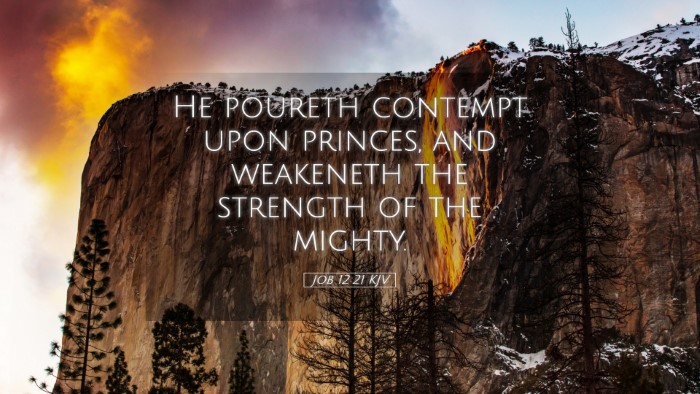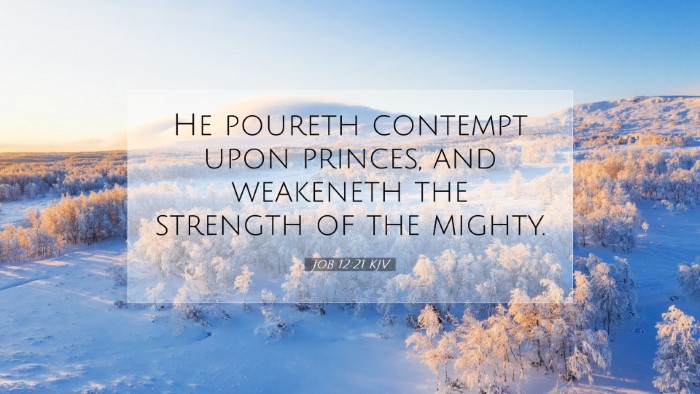Old Testament
Genesis Exodus Leviticus Numbers Deuteronomy Joshua Judges Ruth 1 Samuel 2 Samuel 1 Kings 2 Kings 1 Chronicles 2 Chronicles Ezra Nehemiah Esther Job Psalms Proverbs Ecclesiastes Song of Solomon Isaiah Jeremiah Lamentations Ezekiel Daniel Hosea Joel Amos Obadiah Jonah Micah Nahum Habakkuk Zephaniah Haggai Zechariah MalachiJob 12:21
Job 12:21 KJV
He poureth contempt upon princes, and weakeneth the strength of the mighty.
Job 12:21 Bible Commentary
Commentary on Job 12:21
The verse Job 12:21 states: "He pours contempt upon princes, and loosens the girdle of the strong." This verse reflects the profound themes of divine sovereignty and the transient nature of human power. The following commentary consolidates insights from historical public domain sources, providing a comprehensive examination suitable for pastors, students, theologians, and scholars.
Contextual Analysis
The context of Job 12 is a segment of the discourse where Job emphasizes the incomprehensible wisdom of God as well as His supreme authority over creation. This chapter aligns with Job's responses to his friends, who have accused him of wrongdoing. In this statement, Job asserts that the God he serves is the ultimate judge of humanity, capable of reversing fortunes and dismantling structures of power.
Matthew Henry's Insights
Henry comments on the verse by elucidating the idea that God holds dominion over both the mighty and the vulnerable. He observes that God’s ability to "pour contempt upon princes" suggests a divine authority that levels human pretensions. It emphasizes that no matter a person's earthly status—regarding riches, power, or influence—ultimately, all stand equal before God.
Furthermore, he notes the phrase "loosens the girdle of the strong," indicating a disruption in the strength and stability of those who consider themselves invulnerable. Henry's reflection suggests that spiritual arrogance or the reliance on one's own might can lead to downfall, underscoring the importance of humility before God.
Albert Barnes' Commentary
Barnes elaborates on Job's claim regarding the futility of human strength when faced with God’s mighty works. He interprets "He pours contempt upon princes" as an affirmation of the omnipotence of God that renders the mightiest rulers subject to His will. Princes may be ridiculed or rendered powerless should they fail to acknowledge the divine sovereignty.
In his view, the "loosening of the girdle" serves as a metaphor for removing the power and strength of individuals who believe they can control their destinies. Barnes interprets this imagery as God's ability to dismantle even the strongest warriors, thus reinforcing that human effort apart from divine provision is ultimately futile. He emphasizes the need for acknowledgement of God in all aspects of life, especially regarding authority and power.
Adam Clarke's Observations
Clarke provides a detailed assessment of the semantics of the terms used in Job 12:21. He suggests that "pouring contempt" indicates divine judgement that belittles the pride of human rulers. This act serves as a reminder that human authority is transient and heavily dependent upon God's grace.
Additionally, Clarke discusses the phrase "loosens the girdle of the strong" as emblematic of both physical and spiritual deconstruction. This phrase often refers to a soldier’s girdle, which is essential for maintaining strength and stability in battle. In particular, Clarke imparts that when God decides to act against the proud, He does so by taking away their means of stability and strength, bringing them to a state of humility.
Theological Implications
The implications of Job 12:21 extend beyond its immediate context to broader theological themes.
- Divine Sovereignty: The verse underscores God’s ultimate authority over all creation, emphasizing that earthly power is a temporary construct.
- The Nature of Human Pride: It addresses the inherent danger of pride and self-sufficiency, warning against the hubris that often accompanies positions of authority.
- Call for Humility: The need for humility and dependence on God is a recurring theme found throughout scripture. This verse serves as a poignant reminder of this necessity.
Conclusion
In Job 12:21, the wisdom of Job transcends his suffering, serving as a declaration of God's power over all human authority and superiority. The combined insights from Matthew Henry, Albert Barnes, and Adam Clarke reveal the depth of this verse, challenging readers to reflect on the nature of their own strength in the light of God’s sovereign grace. As such, it invites theologians and scholars to consider both the temporality of earthly power and the eternal relevance of divine authority.


